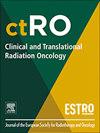脑辐射剂量对脑癌和头颈癌患者早期自述认知功能的影响
IF 2.7
3区 医学
Q3 ONCOLOGY
引用次数: 0
摘要
目的:采用患者报告的预后指标(PROMs)评估脑和头颈癌(HN)患者放疗后的认知变化,并评估脑结构的剂量效应关系。材料和方法纳入2012-2021年间接受RT治疗的原发性脑癌和HN癌患者。收集患者的特征、临床参数以及基线和1年随访时的PROMs。使用EORTC QLQ-C30中的认知功能(CF)、QLQ-BN20中的沟通缺陷(CD)和EQ6D问卷中的一个认知相关问题,后两个问题仅用于脑科患者。缺失的数据被输入,四分制的分数被转换成100分制。从基线到1年的得分变化分为改善/不变或恶化。危险器官(OARs)采用临床或回顾性自动轮廓法进行轮廓化,并计算OARs的剂量。结果共纳入脑癌110例,HN癌356例。中位年龄为56岁(脑)和67.5岁(HN)。颅脑患者的基线和1年CF显著降低(p <;0.001)。ΔCF的单因素分析显示,开始RT时年龄≤65岁,接受化疗,CF基线评分较高,脑平均剂量>;左、右海马体多剂量水平与认知功能减退有统计学相关性。ΔCF年龄≤65岁、CF基线评分较高、脑平均剂量>的多因素分析;3 Gy是显著的预测因子。结论本研究明确了主观认知能力下降的危险因素,提示患者自我感知的认知能力下降可能与年龄、CF基线评分和3 Gy以上脑辐射剂量有关。本文章由计算机程序翻译,如有差异,请以英文原文为准。
The effect of radiation dose to the brain on early self-reported cognitive function in brain and head-and-neck cancer patients
Purpose
Assess cognitive changes after radiotherapy (RT) in brain and head-and-neck (HN) cancer patients using patient-reported outcome measures (PROMs) and evaluate a dose–effect relationship for brain structures.
Materials and methods
Primary brain and HN cancer patients treated with RT between 2012–2021 were included. Patient characteristics, clinical parameters, and PROMs at baseline and 1-year follow-up were collected. Cognitive functioning (CF) from the EORTC QLQ-C30, communication deficit (CD) from the QLQ-BN20, and one cognition-related questions from the EQ6D questionnaire were used, the latter two only for brain patients. Missing data were imputed and the four-point scale scores were transformed to a 100-point scale. Change in scores from baseline to 1-year were categorized into improvement/constant or deterioration. Organs-at-risk (OARs) were contoured either clinically or retrospectively using autocontouring and dose to the OARs were calculated.
Results
A total of 110 brain and 356 HN cancer patients were included. Median age was 56 (brain) and 67.5 (HN) years. Baseline and 1-year CF was significantly lower for brain patients (p < 0.001). Univariate analysis for ΔCF showed that age at start RT ≤ 65 years, receiving chemotherapy, higher CF Baseline score, brain mean dose > 3 Gy, and multiple dose levels to left and right hippocampus were statistically associated with cognitive deterioration. Multivariate analysis for ΔCF identified age at RT ≤ 65 years, higher CF Baseline score, and brain mean dose > 3 Gy as significant predictors.
Conclusion
This study identified risk factors for subjective cognitive decline and suggests that patients’ self-perceived cognitive deterioration may be related to age, CF baseline score and brain radiation dose above 3 Gy.
求助全文
通过发布文献求助,成功后即可免费获取论文全文。
去求助
来源期刊

Clinical and Translational Radiation Oncology
Medicine-Radiology, Nuclear Medicine and Imaging
CiteScore
5.30
自引率
3.20%
发文量
114
审稿时长
40 days
 求助内容:
求助内容: 应助结果提醒方式:
应助结果提醒方式:


